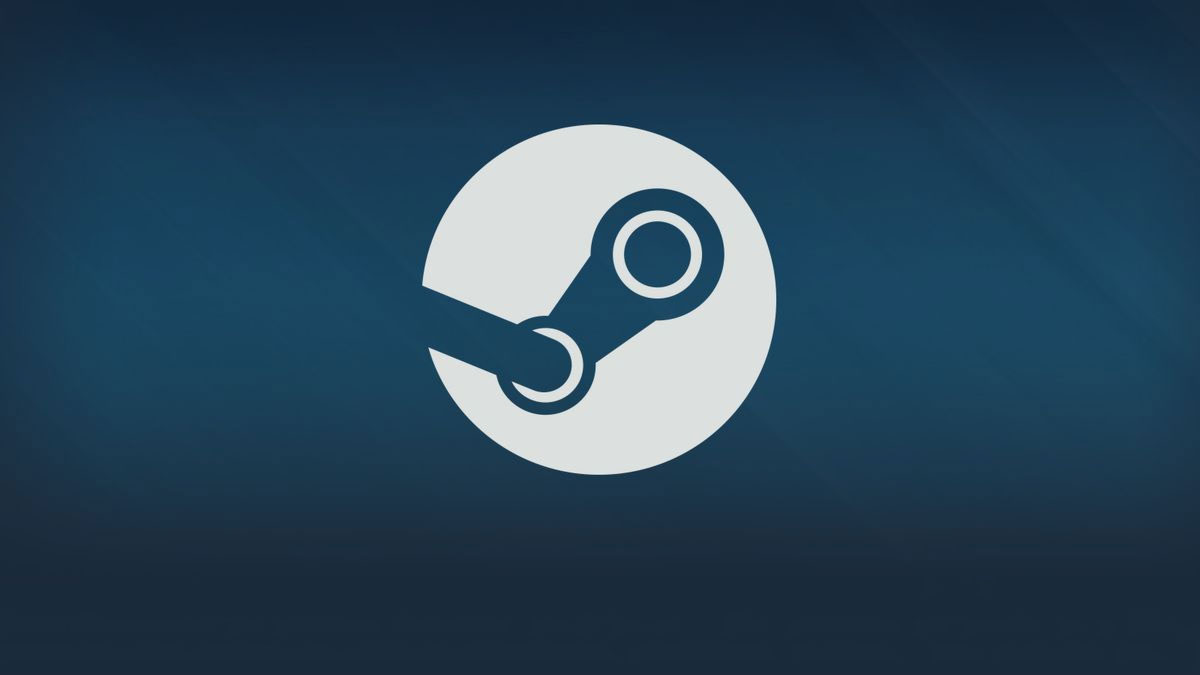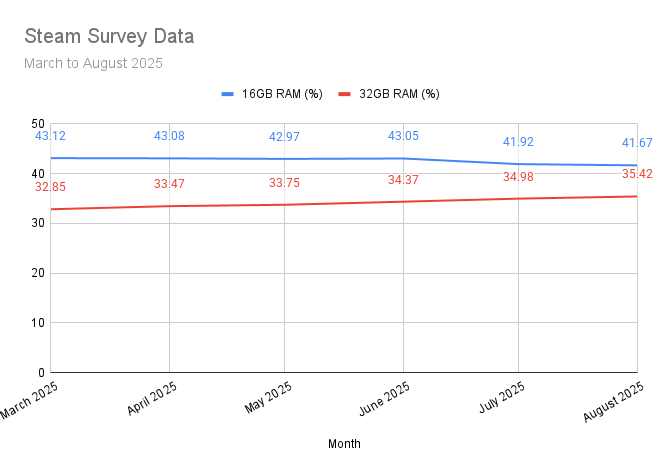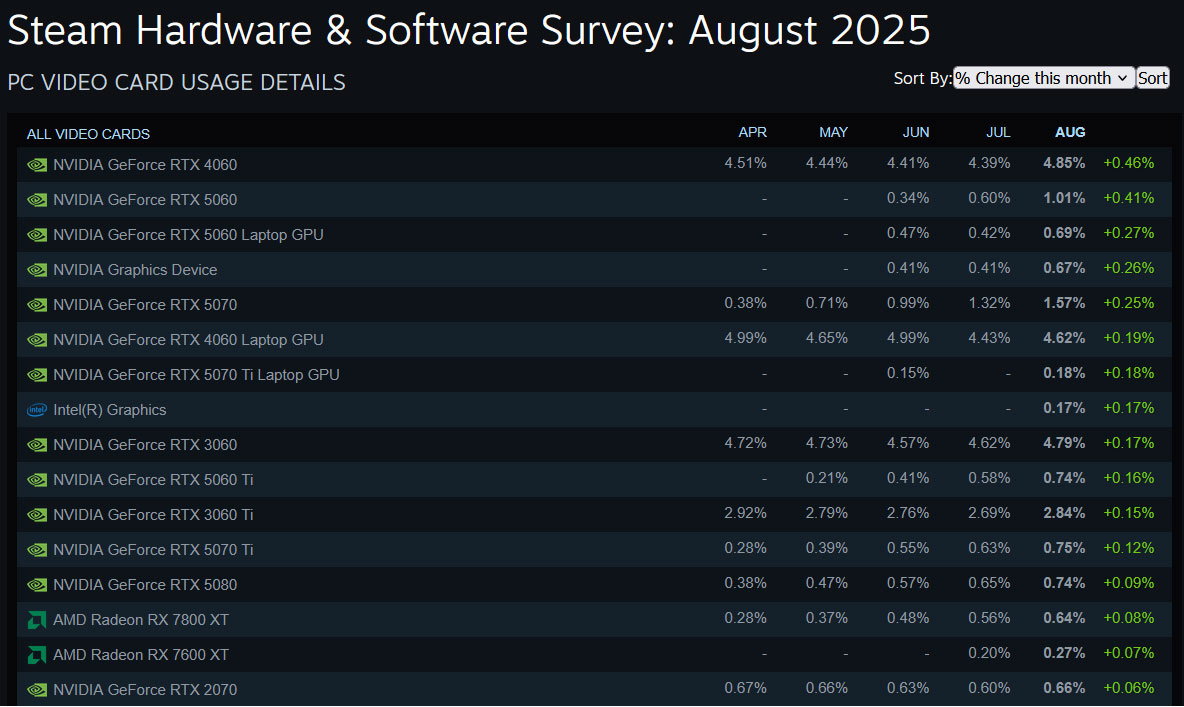32GB of RAM on track to become the new majority for gamers — Steam survey indicates shift could occur before the end of the year
RTX 4060, 1600p screens, and Windows 11 gain momentum

Occasionally, Valve’s Steam Survey data shows we are on the precipice of a major change in the computing landscape. The latest such survey, sharing data collected during August, shows that 32GB of system RAM looks set to become the most popular configuration among Steam gamers in mere months. Drawing lines over graphs, we think the crossover could come before the end of 2025.
There’s been a lot of sound and fury with regard to new graphics cards being ‘stunted’ by anemic levels of VRAM. Perhaps rightfully so, as modern graphics cards don’t have socketed ICs to allow everyday users to add more memory to the board. However, most modern computers, especially desktops and the bulkier gaming laptops, allow owners to boost system RAM using compatible (SO)DIMMs or similar.
Month | 16GB RAM (%) | 32GB RAM (%) |
|---|---|---|
March 2025 | 43.12% | 32.85% |
April 2025 | 43.08% | 33.47% |
May 2025 | 42.97% | 33.75% |
June 2025 | 43.05% | 34.37% |
July 2025 | 41.92% | 34.98% |
August 2025 | 41.67% | 35.42% |
Looking at the Steam Survey data we can see that the percentage of users with 16GB of RAM has steadily declined from 43.12 to 41.67% over the last six months. Meanwhile, 32GB users have inexorably grown from 32.85 to 35.42% of the Steam gaming populace.
We’d expect the impetus behind this crossover to be those buying new machines moving up a level, falling DDR5 prices, and the well publicized demands of modern AAA games titles.
RTX 4060 momentum, 1600p screens, and Windows 11
Video card trends are often interesting to see play out in the Steam data. This month, the continued momentum behind the last-gen Nvidia GeForce RTX 4060 may be confounding to some.
If we look at discrete graphics cards on a popular retail site like Newegg, for example, buying an RTX 4060 to add to your desktop doesn’t look very sensible (there’s just two samples in stock at $399 and $499). Meanwhile, you can easily grab an RTX 5060 at the same store under $300, like this Asus Dual or Gigabyte WindForce model.
Instead, we’ll have to assume one or a few alternatives: other world regions still have RTX 4060 stocks in abundance to sell at discount, and/or there’s a pile of RTX 4060 PC systems still being sold, and potentially being discounted at attractive prices.
Get Tom's Hardware's best news and in-depth reviews, straight to your inbox.
We were also interested to see the biggest gainer in primary display resolution stakes was 2560 x 1600 pixels (WQXGA) – primarily a panel resolution that is associated with laptops. The second-best growth is seen in 2560 x 1440 pixel (QHD) monitor users.
Old favorites like FHD 1080p and 4K 2160p basically flat-lined last month. We note that the dominance of 1080p screens in the survey looks solid at just over 54%, with 1440p at a little over 20% and third placed 4K a long way behind at about 4.5%.
On operating systems, Windows 11 has broken the 60% barrier in the latest stats. There remains a considerable 35% chunk of Windows 10 users as we approach that OSes end of life. Linux has had quite a poor month, with a slight dip in this survey showing just 2.65% of Steam gamers were using this OS.
Follow Tom's Hardware on Google News, or add us as a preferred source, to get our up-to-date news, analysis, and reviews in your feeds. Make sure to click the Follow button!

Mark Tyson is a news editor at Tom's Hardware. He enjoys covering the full breadth of PC tech; from business and semiconductor design to products approaching the edge of reason.
-
dimar All gaming and office PCs I've built for my clients for the last 7 years had at least 32GB RAM. Many users tend to open lots of tabs and other apps simultaneously. So this has been the norm for awhile at least for me.Reply -
alceryes I think this is due to the premature ending of Windows 10 support by Microsoft. People are buying new computers and they are trying to futureproof.32GBs will continue to gain over 16GB through this holiday season. I think many who are still on Windows 10 will jump to a 32GB+ computer with the holiday sales.Reply -
ThatMouse Given how cheap RAM is, 2 sticks of 32GB (64GB) should be the norm unless you're building a budget machine.Reply -
Flayed Reply
No point in having extra RAM if it is never used.ThatMouse said:Given how cheap RAM is, 2 sticks of 32GB (64GB) should be the norm unless you're building a budget machine. -
CParsons Reply
'Better to have it and not need it than need it and not have it.' is the general outlook I believe.Flayed said:No point in having extra RAM if it is never used. -
excalibur1814 All the office computers here have 16Gb, which is the absolute minimum. No point in going crazy. Obviously 32Gb, up to 64Gb for specific cases. Microsoft/Windows... pushing up the specs over time. Then, there's Superfetch.Reply
Remember the days of 256Mb ram, with Windows Vista? Man, Microsoft received a lot of blame for lazy/cheap OEMS with that. -
Alvar "Miles" Udell I can sit at the desktop with just email, internet, chat, and other non demanding things that many people have up and be easily sitting at 18gb ram used. Granted I have copious amounts of memory so nothing is paged out, but there's no way I'd consider less than 32gb RAM in the DDR5 era. It may be the easiest thing of the core system to replace later, but it's also one of the easiest places to maximize gains by spending just a little more.Reply -
Notton Minimum = 16GBReply
Recommended = 24 to 32GB
More than enough = 48GB
Complete overkill = >64GB
Even in a lighter weight OS, once you start using the iGPU for gaming, 16GB becomes insufficient and you'll want 24GB or 32GB. -
das_stig It's not that the extra ram is really needed for day 2 day stuff, it's just Windows likes to hog every last byte to do it's own background caching etc. I know for fact I could do my work on my laptop in 8GB of ram with ease and yet Windows 11 reports massive usage..Reply

